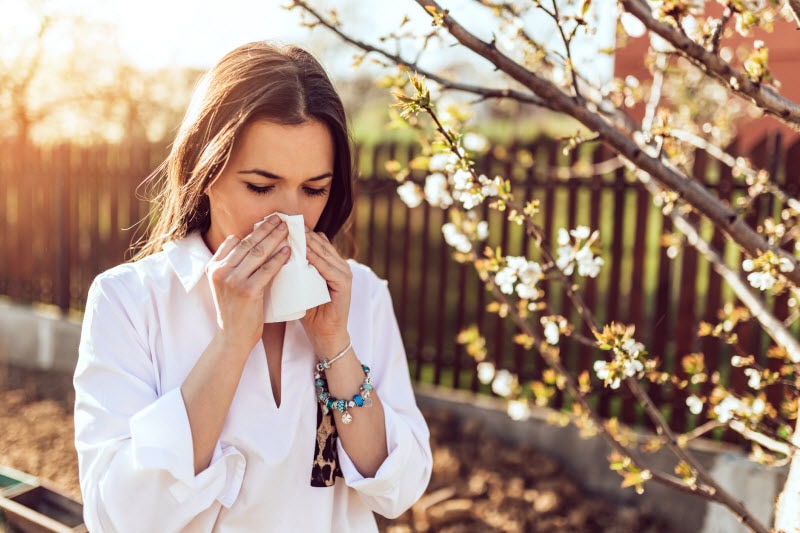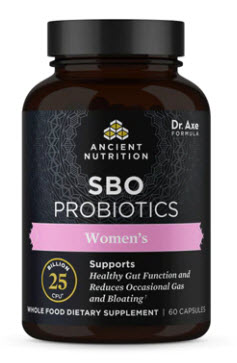It’s that time of year again, when you wake up feeling the sniffles, a scratchy throat and itchy eyes. You may wonder about the cause of these common complaints, is it a virus or something else? If you suffer from spring allergies, it can be hard to distinguish between allergy symptoms and other common ailments, but there are a few unique signs of allergies that may help you to pinpoint the issue.
Signs of Allergies in Spring
Spring allergy symptoms are often similar to what you’d experience with a common cold, respiratory virus or sinus infection. Stuffy nose, scratchy throat, post-nasal drip, excess mucus production and sneezing are common symptoms for several respiratory issues, but there are some unique signs of allergies that may help you to make the distinction.
1. It lasts weeks
Virus symptoms will typically subside within 1-2 weeks, so you’ll notice and rise and fall of severity. With seasonal allergies, the symptoms likely won’t dissipate until the trigger is gone for good, which can take several weeks or even months.
2. It gets worse in certain environments
Allergies will change in different environments, as your exposure to a trigger increases. You may feel fine in the morning and then symptoms will rage in the afternoon. Some allergen triggers include pollen, mold and other airborne substances that can affect the lungs, nose and eyes.
3. Your eyes are itchy and watery
One sign of spring allergies that is less common with viral infections is symptoms affecting the eyes. One report found that among adults with allergies, over 50% experience itchy eyes and 38% have watery eyes. Red eyes and swollen eyes are also signs of allergies, although less common. These symptoms are due to exposure to a trigger like pollen, household dust and mites, or air pollution that causes eye irritation.
4. You can’t concentrate
Seasonal allergies often cause brain fog and trouble concentrating. One study found that allergic reactions to ragweed pollen causes significant cognitive difficulties, including slowed speed of cognition processing. Allergies can also impact your sleep, which contributes to a cycle of fatigue and impacts your ability to focus on tasks during the day.
5. You’re having mood swings
If spring brings on feelings of sadness and lethargy, it may actually be a sign of allergies. Allergies can cause mood changes, increased sadness and even symptoms of depression. One systematic review and meta-analysis found that children and adults with allergic disorders had a higher risk of depression than control groups.
In severe cases, seasonal allergies can cause more serious symptoms, including asthma attacks, shortness of breath and wheezing, chest tightness and difficulty breathing. These signs of allergies would occur after being exposed to pollen, ragweed, grass, tree and flower residue, or any other trigger that causes a severe adverse reaction.
Natural remedies for allergies
1. Avoid trigger foods
One way to reduce inflammation in the body and support a healthy immune system is to avoid foods that commonly cause sensitivities and can exacerbate allergy symptoms. Some common allergens or trigger foods include conventional dairy, alcohol, peanuts, soy, caffeine, shellfish, wheat and artificial sweeteners. Foods high in sugar should be avoided, as should packaged, processed foods that contain preservatives and artificial ingredients.
2. Eat nourishing, anti-inflammatory foods
As you avoid common allergens and trigger foods, bring more nourishing, nutrient-rich, anti-inflammatory foods into your diet. Opt for fresh whole foods in a range of colors, which will be rich in antioxidants and support immune system health.
Some of the best foods to eat for allergies include raw local honey, bone broth, apple cider vinegar, organic vegetables, grass-fed meats, free-range poultry and wild-caught salmon. Adding probiotic foods to your diet may also help to support a healthy gut, which plays a major role in immune system function.
3. Stay hydrated
Make sure to stay hydrated by drinking 8-10 glasses of water per day, or more if you’re exposed to high temperatures or exercising. Proper hydration will support the detoxification of toxins in the body and allow mucus to be expelled easier.
4. Take probiotics
Probiotic supplements may support a healthy inflammation response, so they can be used during allergy season and beyond to keep symptoms at bay.†
5. Take vitamin A
Getting around 2,000 micrograms of vitamin A per day, from fresh foods or supplements, may help to promote a healthy inflammatory response and histamine production in the body.†
6. Use essential oils
Essential oils can be used to open the nasal passages and provide a cooling, relieving effects. Peppermint and eucalyptus oils can be applied to the best, temples and bottoms of the feet to open the airways and provide an invigorating effect.
Lavender essential oil has calming, soothing properties and can be used to combat low mood and trouble sleeping. Simply apply 1-2 drops to your wrists and temples, or diffuse it at home. And lemon essential oil has detoxifying properties and helps to cleanse a space when diffused at home.
7. Shower before bed
When allergens get on your clothes and shoes, particles are brought into your home. This makes it impossible to find relief because the trigger is always present. Try to reduce exposure to triggers like pollen by taking off your shoes before entering your home and showering before bed. It’s also important to wash your hands after being outdoors.
†These statements have not been approved by the Food and Drug Administration. These products are not intended to diagnose, treat, cure or prevent disease.



